Organisational Behaviour Report: Unilever's Performance Analysis
VerifiedAdded on 2020/11/12
|17
|5552
|91
Report
AI Summary
This report provides an in-depth analysis of organisational behaviour, using Unilever as a case study. It explores how organisational culture, power dynamics, and political influences impact employee behaviour and overall performance. The report delves into various motivational techniques, distinguishing between extrinsic and intrinsic methods, and discusses the application of motivational theories like Maslow's Need Hierarchy. Furthermore, it examines the characteristics of effective and ineffective teams, highlighting the importance of leadership, employee attitudes, and working environments. The report covers the influence of culture, power, and politics on behaviour and performance. It also analyses methods to motivate individuals and groups of employees and demonstrates effective team characteristics compared to ineffective teams. The report concludes with a discussion of key organisational behaviour concepts and philosophies.
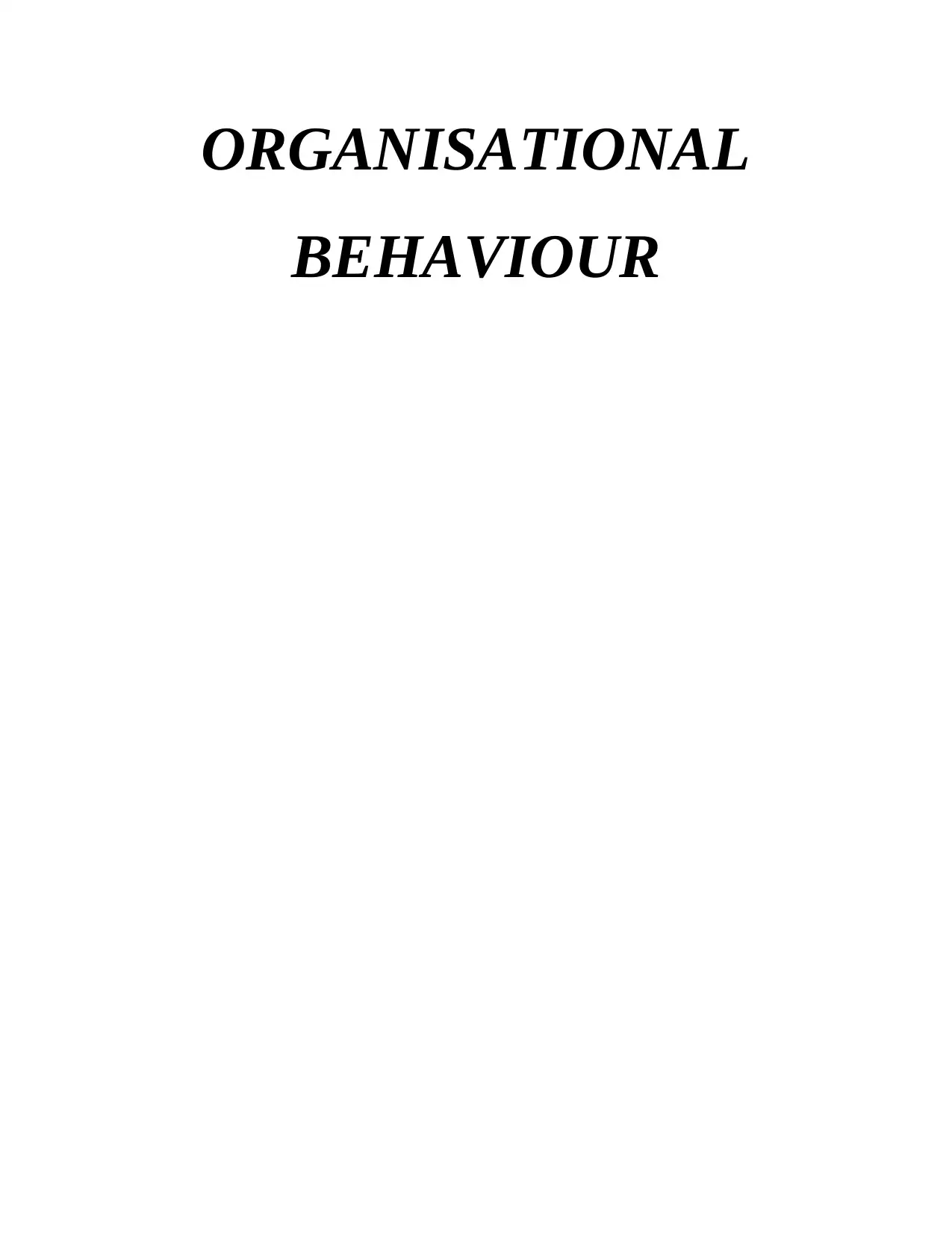
ORGANISATIONAL
BEHAVIOUR
BEHAVIOUR
Paraphrase This Document
Need a fresh take? Get an instant paraphrase of this document with our AI Paraphraser
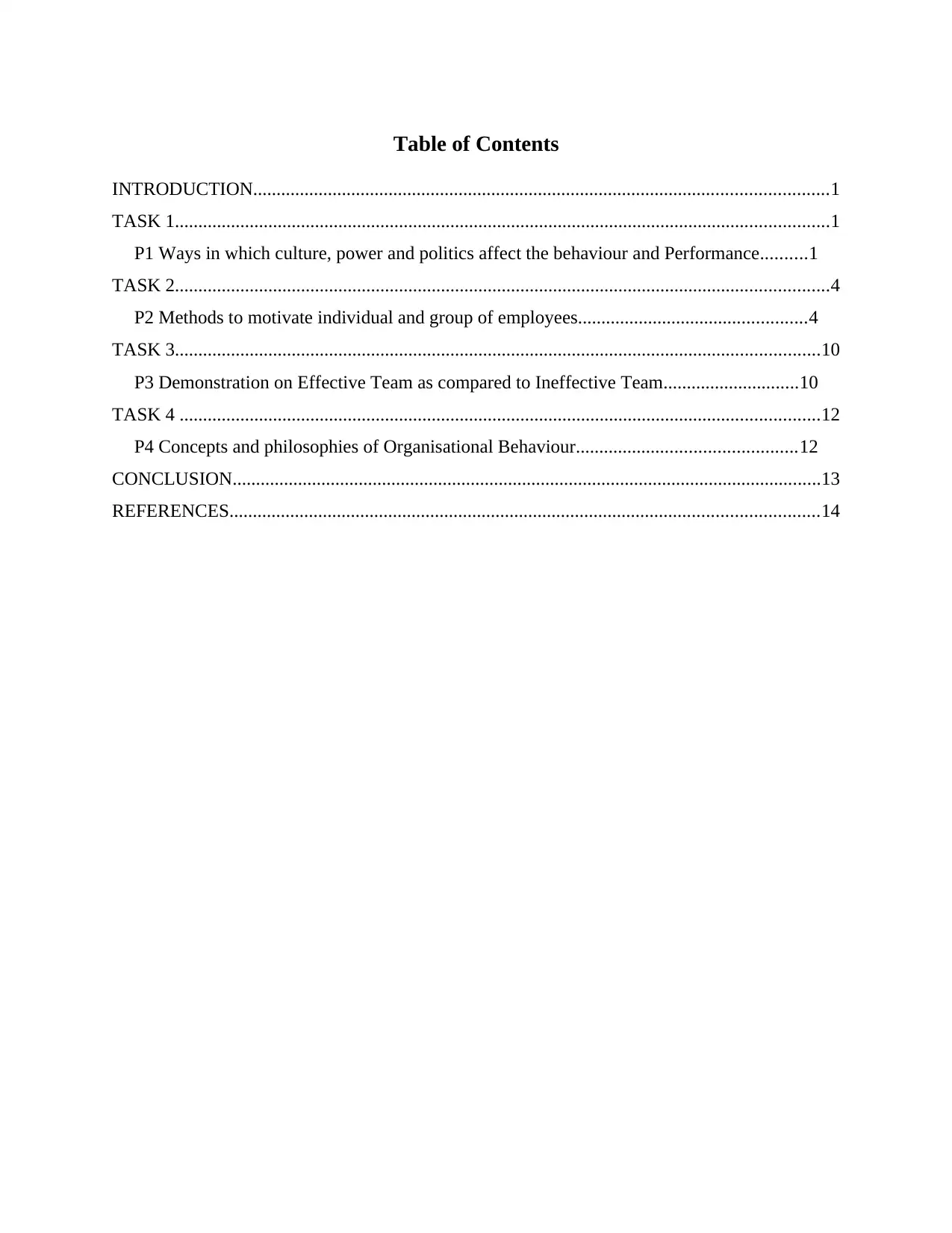
Table of Contents
INTRODUCTION...........................................................................................................................1
TASK 1............................................................................................................................................1
P1 Ways in which culture, power and politics affect the behaviour and Performance..........1
TASK 2............................................................................................................................................4
P2 Methods to motivate individual and group of employees.................................................4
TASK 3..........................................................................................................................................10
P3 Demonstration on Effective Team as compared to Ineffective Team.............................10
TASK 4 .........................................................................................................................................12
P4 Concepts and philosophies of Organisational Behaviour...............................................12
CONCLUSION..............................................................................................................................13
REFERENCES..............................................................................................................................14
INTRODUCTION...........................................................................................................................1
TASK 1............................................................................................................................................1
P1 Ways in which culture, power and politics affect the behaviour and Performance..........1
TASK 2............................................................................................................................................4
P2 Methods to motivate individual and group of employees.................................................4
TASK 3..........................................................................................................................................10
P3 Demonstration on Effective Team as compared to Ineffective Team.............................10
TASK 4 .........................................................................................................................................12
P4 Concepts and philosophies of Organisational Behaviour...............................................12
CONCLUSION..............................................................................................................................13
REFERENCES..............................................................................................................................14

⊘ This is a preview!⊘
Do you want full access?
Subscribe today to unlock all pages.

Trusted by 1+ million students worldwide
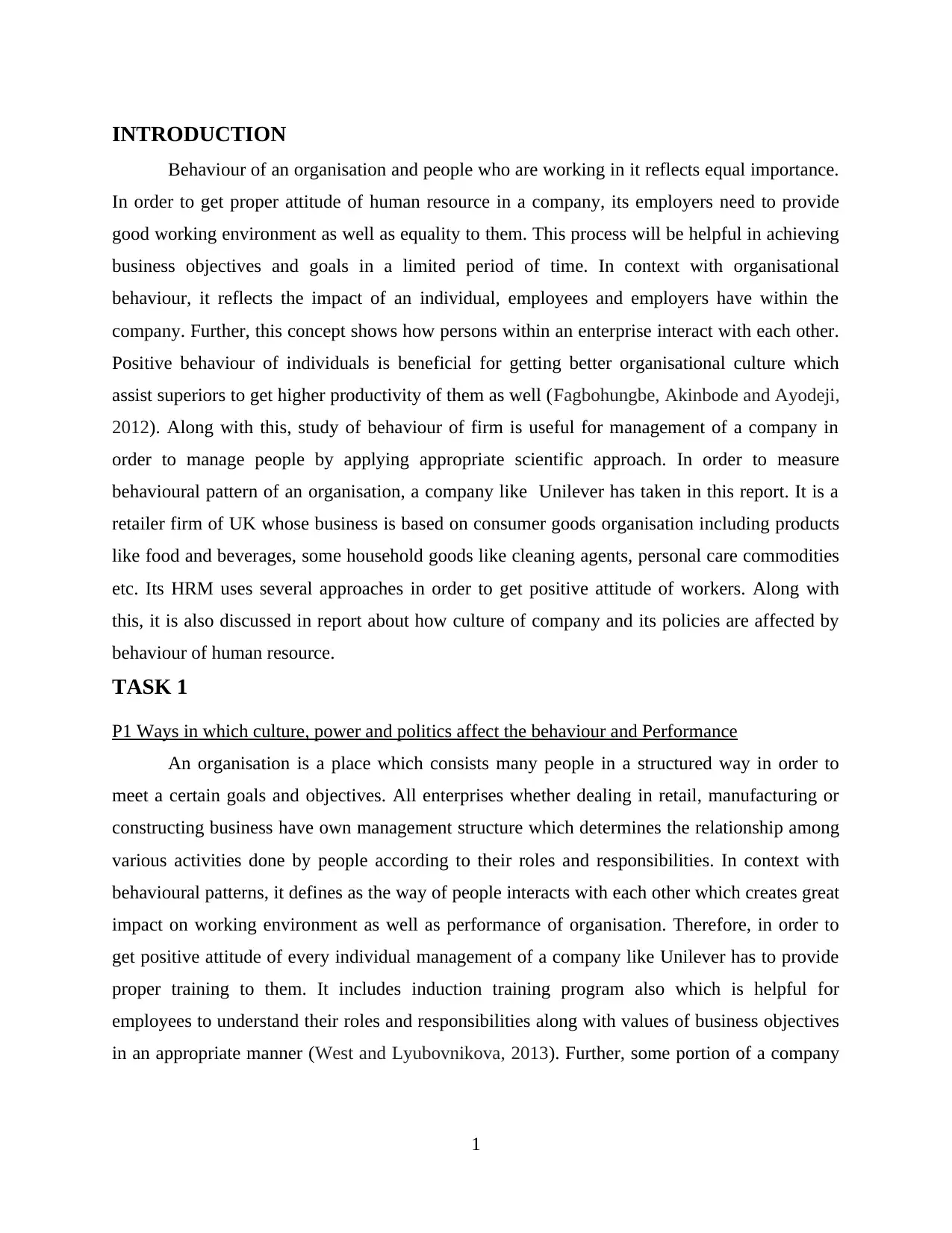
INTRODUCTION
Behaviour of an organisation and people who are working in it reflects equal importance.
In order to get proper attitude of human resource in a company, its employers need to provide
good working environment as well as equality to them. This process will be helpful in achieving
business objectives and goals in a limited period of time. In context with organisational
behaviour, it reflects the impact of an individual, employees and employers have within the
company. Further, this concept shows how persons within an enterprise interact with each other.
Positive behaviour of individuals is beneficial for getting better organisational culture which
assist superiors to get higher productivity of them as well (Fagbohungbe, Akinbode and Ayodeji,
2012). Along with this, study of behaviour of firm is useful for management of a company in
order to manage people by applying appropriate scientific approach. In order to measure
behavioural pattern of an organisation, a company like Unilever has taken in this report. It is a
retailer firm of UK whose business is based on consumer goods organisation including products
like food and beverages, some household goods like cleaning agents, personal care commodities
etc. Its HRM uses several approaches in order to get positive attitude of workers. Along with
this, it is also discussed in report about how culture of company and its policies are affected by
behaviour of human resource.
TASK 1
P1 Ways in which culture, power and politics affect the behaviour and Performance
An organisation is a place which consists many people in a structured way in order to
meet a certain goals and objectives. All enterprises whether dealing in retail, manufacturing or
constructing business have own management structure which determines the relationship among
various activities done by people according to their roles and responsibilities. In context with
behavioural patterns, it defines as the way of people interacts with each other which creates great
impact on working environment as well as performance of organisation. Therefore, in order to
get positive attitude of every individual management of a company like Unilever has to provide
proper training to them. It includes induction training program also which is helpful for
employees to understand their roles and responsibilities along with values of business objectives
in an appropriate manner (West and Lyubovnikova, 2013). Further, some portion of a company
1
Behaviour of an organisation and people who are working in it reflects equal importance.
In order to get proper attitude of human resource in a company, its employers need to provide
good working environment as well as equality to them. This process will be helpful in achieving
business objectives and goals in a limited period of time. In context with organisational
behaviour, it reflects the impact of an individual, employees and employers have within the
company. Further, this concept shows how persons within an enterprise interact with each other.
Positive behaviour of individuals is beneficial for getting better organisational culture which
assist superiors to get higher productivity of them as well (Fagbohungbe, Akinbode and Ayodeji,
2012). Along with this, study of behaviour of firm is useful for management of a company in
order to manage people by applying appropriate scientific approach. In order to measure
behavioural pattern of an organisation, a company like Unilever has taken in this report. It is a
retailer firm of UK whose business is based on consumer goods organisation including products
like food and beverages, some household goods like cleaning agents, personal care commodities
etc. Its HRM uses several approaches in order to get positive attitude of workers. Along with
this, it is also discussed in report about how culture of company and its policies are affected by
behaviour of human resource.
TASK 1
P1 Ways in which culture, power and politics affect the behaviour and Performance
An organisation is a place which consists many people in a structured way in order to
meet a certain goals and objectives. All enterprises whether dealing in retail, manufacturing or
constructing business have own management structure which determines the relationship among
various activities done by people according to their roles and responsibilities. In context with
behavioural patterns, it defines as the way of people interacts with each other which creates great
impact on working environment as well as performance of organisation. Therefore, in order to
get positive attitude of every individual management of a company like Unilever has to provide
proper training to them. It includes induction training program also which is helpful for
employees to understand their roles and responsibilities along with values of business objectives
in an appropriate manner (West and Lyubovnikova, 2013). Further, some portion of a company
1
Paraphrase This Document
Need a fresh take? Get an instant paraphrase of this document with our AI Paraphraser
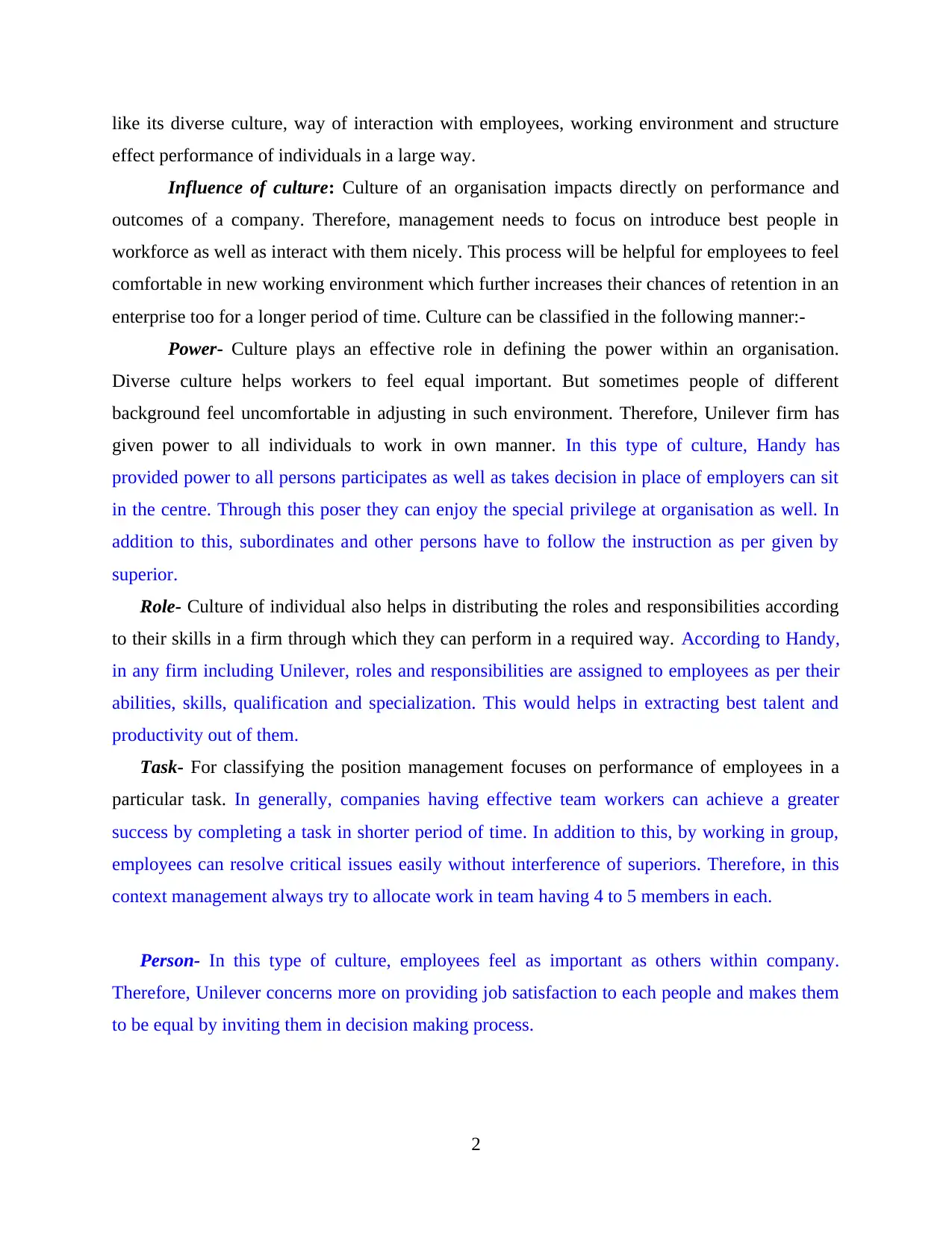
like its diverse culture, way of interaction with employees, working environment and structure
effect performance of individuals in a large way.
Influence of culture: Culture of an organisation impacts directly on performance and
outcomes of a company. Therefore, management needs to focus on introduce best people in
workforce as well as interact with them nicely. This process will be helpful for employees to feel
comfortable in new working environment which further increases their chances of retention in an
enterprise too for a longer period of time. Culture can be classified in the following manner:-
Power- Culture plays an effective role in defining the power within an organisation.
Diverse culture helps workers to feel equal important. But sometimes people of different
background feel uncomfortable in adjusting in such environment. Therefore, Unilever firm has
given power to all individuals to work in own manner. In this type of culture, Handy has
provided power to all persons participates as well as takes decision in place of employers can sit
in the centre. Through this poser they can enjoy the special privilege at organisation as well. In
addition to this, subordinates and other persons have to follow the instruction as per given by
superior.
Role- Culture of individual also helps in distributing the roles and responsibilities according
to their skills in a firm through which they can perform in a required way. According to Handy,
in any firm including Unilever, roles and responsibilities are assigned to employees as per their
abilities, skills, qualification and specialization. This would helps in extracting best talent and
productivity out of them.
Task- For classifying the position management focuses on performance of employees in a
particular task. In generally, companies having effective team workers can achieve a greater
success by completing a task in shorter period of time. In addition to this, by working in group,
employees can resolve critical issues easily without interference of superiors. Therefore, in this
context management always try to allocate work in team having 4 to 5 members in each.
Person- In this type of culture, employees feel as important as others within company.
Therefore, Unilever concerns more on providing job satisfaction to each people and makes them
to be equal by inviting them in decision making process.
2
effect performance of individuals in a large way.
Influence of culture: Culture of an organisation impacts directly on performance and
outcomes of a company. Therefore, management needs to focus on introduce best people in
workforce as well as interact with them nicely. This process will be helpful for employees to feel
comfortable in new working environment which further increases their chances of retention in an
enterprise too for a longer period of time. Culture can be classified in the following manner:-
Power- Culture plays an effective role in defining the power within an organisation.
Diverse culture helps workers to feel equal important. But sometimes people of different
background feel uncomfortable in adjusting in such environment. Therefore, Unilever firm has
given power to all individuals to work in own manner. In this type of culture, Handy has
provided power to all persons participates as well as takes decision in place of employers can sit
in the centre. Through this poser they can enjoy the special privilege at organisation as well. In
addition to this, subordinates and other persons have to follow the instruction as per given by
superior.
Role- Culture of individual also helps in distributing the roles and responsibilities according
to their skills in a firm through which they can perform in a required way. According to Handy,
in any firm including Unilever, roles and responsibilities are assigned to employees as per their
abilities, skills, qualification and specialization. This would helps in extracting best talent and
productivity out of them.
Task- For classifying the position management focuses on performance of employees in a
particular task. In generally, companies having effective team workers can achieve a greater
success by completing a task in shorter period of time. In addition to this, by working in group,
employees can resolve critical issues easily without interference of superiors. Therefore, in this
context management always try to allocate work in team having 4 to 5 members in each.
Person- In this type of culture, employees feel as important as others within company.
Therefore, Unilever concerns more on providing job satisfaction to each people and makes them
to be equal by inviting them in decision making process.
2
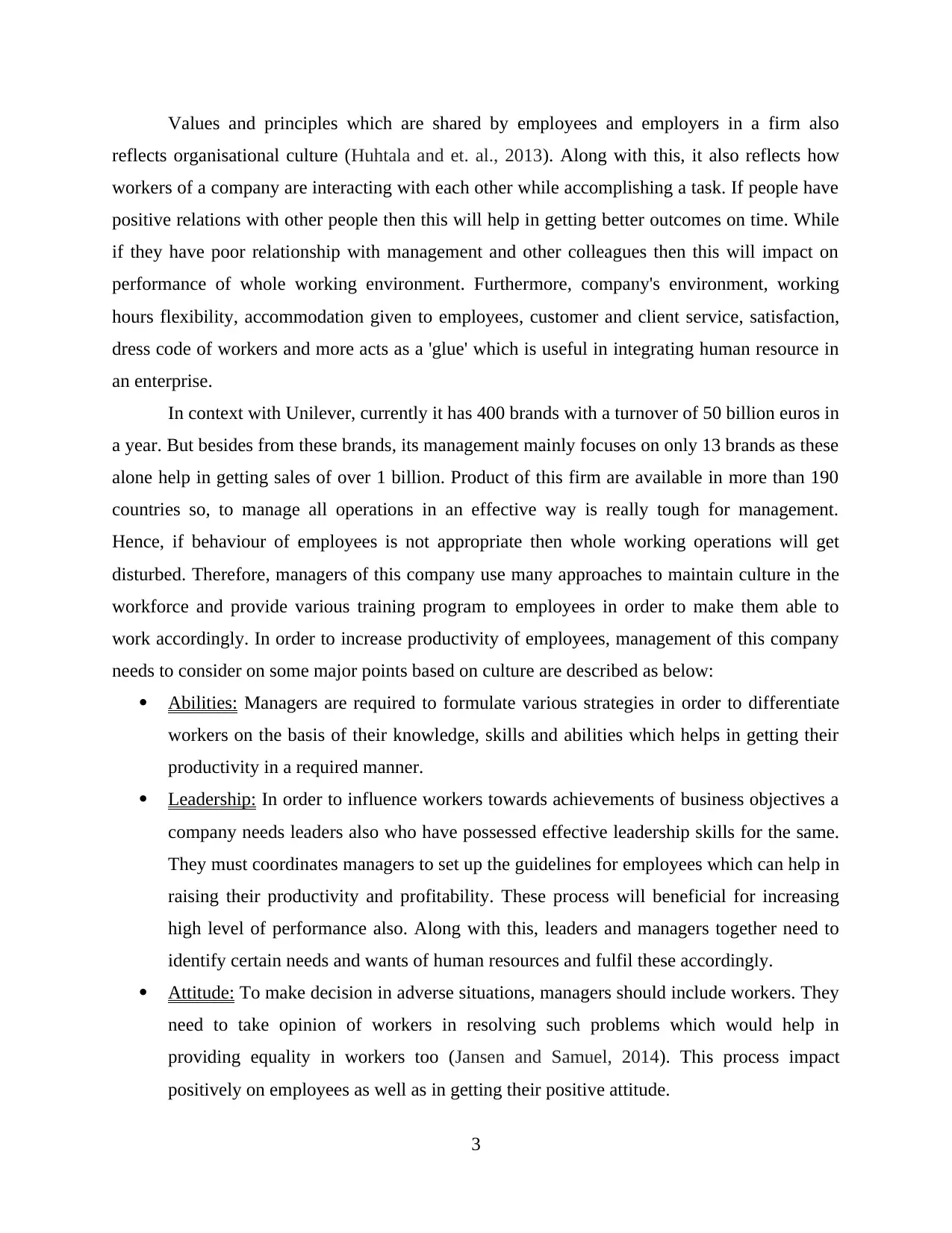
Values and principles which are shared by employees and employers in a firm also
reflects organisational culture (Huhtala and et. al., 2013). Along with this, it also reflects how
workers of a company are interacting with each other while accomplishing a task. If people have
positive relations with other people then this will help in getting better outcomes on time. While
if they have poor relationship with management and other colleagues then this will impact on
performance of whole working environment. Furthermore, company's environment, working
hours flexibility, accommodation given to employees, customer and client service, satisfaction,
dress code of workers and more acts as a 'glue' which is useful in integrating human resource in
an enterprise.
In context with Unilever, currently it has 400 brands with a turnover of 50 billion euros in
a year. But besides from these brands, its management mainly focuses on only 13 brands as these
alone help in getting sales of over 1 billion. Product of this firm are available in more than 190
countries so, to manage all operations in an effective way is really tough for management.
Hence, if behaviour of employees is not appropriate then whole working operations will get
disturbed. Therefore, managers of this company use many approaches to maintain culture in the
workforce and provide various training program to employees in order to make them able to
work accordingly. In order to increase productivity of employees, management of this company
needs to consider on some major points based on culture are described as below:
Abilities: Managers are required to formulate various strategies in order to differentiate
workers on the basis of their knowledge, skills and abilities which helps in getting their
productivity in a required manner.
Leadership: In order to influence workers towards achievements of business objectives a
company needs leaders also who have possessed effective leadership skills for the same.
They must coordinates managers to set up the guidelines for employees which can help in
raising their productivity and profitability. These process will beneficial for increasing
high level of performance also. Along with this, leaders and managers together need to
identify certain needs and wants of human resources and fulfil these accordingly.
Attitude: To make decision in adverse situations, managers should include workers. They
need to take opinion of workers in resolving such problems which would help in
providing equality in workers too (Jansen and Samuel, 2014). This process impact
positively on employees as well as in getting their positive attitude.
3
reflects organisational culture (Huhtala and et. al., 2013). Along with this, it also reflects how
workers of a company are interacting with each other while accomplishing a task. If people have
positive relations with other people then this will help in getting better outcomes on time. While
if they have poor relationship with management and other colleagues then this will impact on
performance of whole working environment. Furthermore, company's environment, working
hours flexibility, accommodation given to employees, customer and client service, satisfaction,
dress code of workers and more acts as a 'glue' which is useful in integrating human resource in
an enterprise.
In context with Unilever, currently it has 400 brands with a turnover of 50 billion euros in
a year. But besides from these brands, its management mainly focuses on only 13 brands as these
alone help in getting sales of over 1 billion. Product of this firm are available in more than 190
countries so, to manage all operations in an effective way is really tough for management.
Hence, if behaviour of employees is not appropriate then whole working operations will get
disturbed. Therefore, managers of this company use many approaches to maintain culture in the
workforce and provide various training program to employees in order to make them able to
work accordingly. In order to increase productivity of employees, management of this company
needs to consider on some major points based on culture are described as below:
Abilities: Managers are required to formulate various strategies in order to differentiate
workers on the basis of their knowledge, skills and abilities which helps in getting their
productivity in a required manner.
Leadership: In order to influence workers towards achievements of business objectives a
company needs leaders also who have possessed effective leadership skills for the same.
They must coordinates managers to set up the guidelines for employees which can help in
raising their productivity and profitability. These process will beneficial for increasing
high level of performance also. Along with this, leaders and managers together need to
identify certain needs and wants of human resources and fulfil these accordingly.
Attitude: To make decision in adverse situations, managers should include workers. They
need to take opinion of workers in resolving such problems which would help in
providing equality in workers too (Jansen and Samuel, 2014). This process impact
positively on employees as well as in getting their positive attitude.
3
⊘ This is a preview!⊘
Do you want full access?
Subscribe today to unlock all pages.

Trusted by 1+ million students worldwide
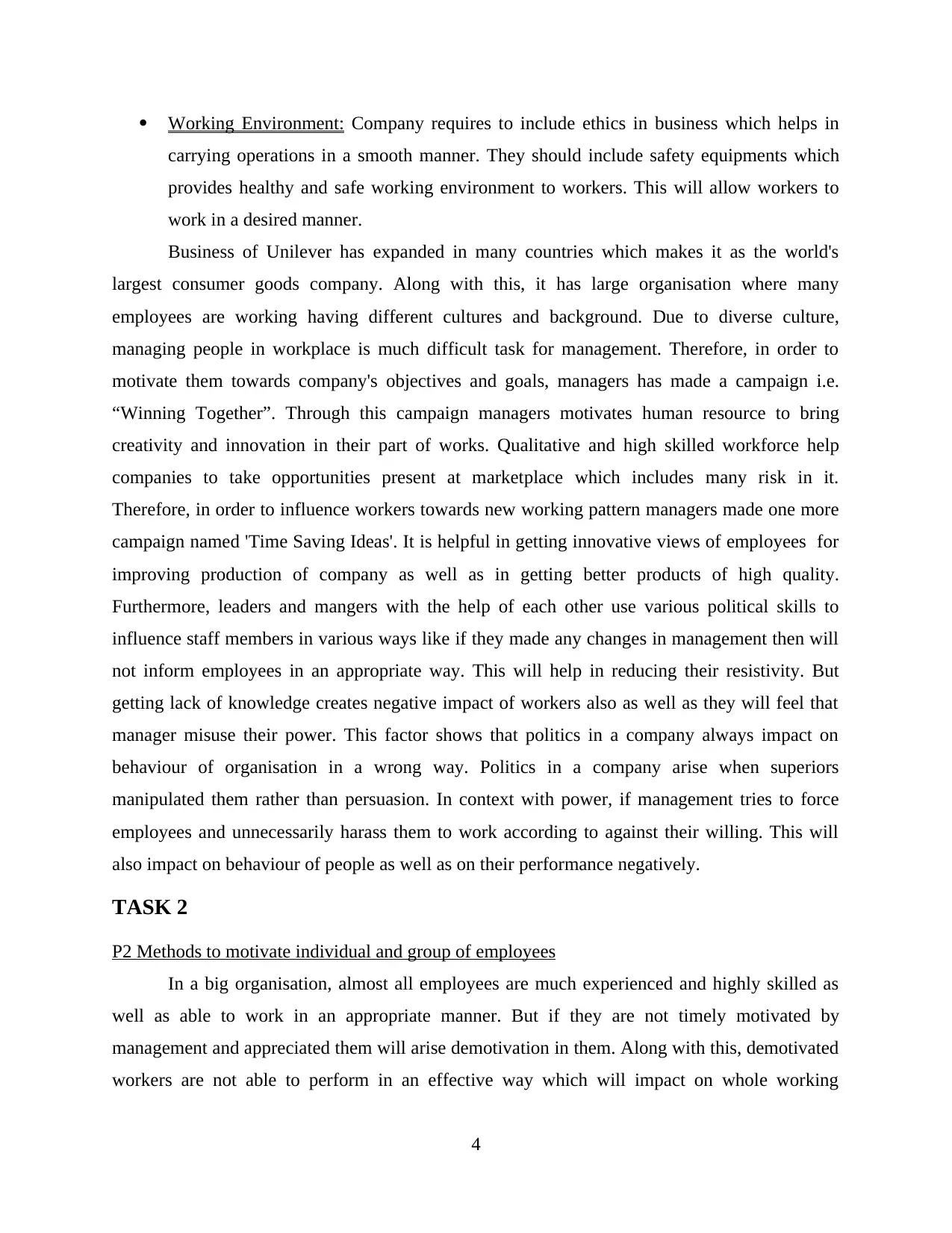
Working Environment: Company requires to include ethics in business which helps in
carrying operations in a smooth manner. They should include safety equipments which
provides healthy and safe working environment to workers. This will allow workers to
work in a desired manner.
Business of Unilever has expanded in many countries which makes it as the world's
largest consumer goods company. Along with this, it has large organisation where many
employees are working having different cultures and background. Due to diverse culture,
managing people in workplace is much difficult task for management. Therefore, in order to
motivate them towards company's objectives and goals, managers has made a campaign i.e.
“Winning Together”. Through this campaign managers motivates human resource to bring
creativity and innovation in their part of works. Qualitative and high skilled workforce help
companies to take opportunities present at marketplace which includes many risk in it.
Therefore, in order to influence workers towards new working pattern managers made one more
campaign named 'Time Saving Ideas'. It is helpful in getting innovative views of employees for
improving production of company as well as in getting better products of high quality.
Furthermore, leaders and mangers with the help of each other use various political skills to
influence staff members in various ways like if they made any changes in management then will
not inform employees in an appropriate way. This will help in reducing their resistivity. But
getting lack of knowledge creates negative impact of workers also as well as they will feel that
manager misuse their power. This factor shows that politics in a company always impact on
behaviour of organisation in a wrong way. Politics in a company arise when superiors
manipulated them rather than persuasion. In context with power, if management tries to force
employees and unnecessarily harass them to work according to against their willing. This will
also impact on behaviour of people as well as on their performance negatively.
TASK 2
P2 Methods to motivate individual and group of employees
In a big organisation, almost all employees are much experienced and highly skilled as
well as able to work in an appropriate manner. But if they are not timely motivated by
management and appreciated them will arise demotivation in them. Along with this, demotivated
workers are not able to perform in an effective way which will impact on whole working
4
carrying operations in a smooth manner. They should include safety equipments which
provides healthy and safe working environment to workers. This will allow workers to
work in a desired manner.
Business of Unilever has expanded in many countries which makes it as the world's
largest consumer goods company. Along with this, it has large organisation where many
employees are working having different cultures and background. Due to diverse culture,
managing people in workplace is much difficult task for management. Therefore, in order to
motivate them towards company's objectives and goals, managers has made a campaign i.e.
“Winning Together”. Through this campaign managers motivates human resource to bring
creativity and innovation in their part of works. Qualitative and high skilled workforce help
companies to take opportunities present at marketplace which includes many risk in it.
Therefore, in order to influence workers towards new working pattern managers made one more
campaign named 'Time Saving Ideas'. It is helpful in getting innovative views of employees for
improving production of company as well as in getting better products of high quality.
Furthermore, leaders and mangers with the help of each other use various political skills to
influence staff members in various ways like if they made any changes in management then will
not inform employees in an appropriate way. This will help in reducing their resistivity. But
getting lack of knowledge creates negative impact of workers also as well as they will feel that
manager misuse their power. This factor shows that politics in a company always impact on
behaviour of organisation in a wrong way. Politics in a company arise when superiors
manipulated them rather than persuasion. In context with power, if management tries to force
employees and unnecessarily harass them to work according to against their willing. This will
also impact on behaviour of people as well as on their performance negatively.
TASK 2
P2 Methods to motivate individual and group of employees
In a big organisation, almost all employees are much experienced and highly skilled as
well as able to work in an appropriate manner. But if they are not timely motivated by
management and appreciated them will arise demotivation in them. Along with this, demotivated
workers are not able to perform in an effective way which will impact on whole working
4
Paraphrase This Document
Need a fresh take? Get an instant paraphrase of this document with our AI Paraphraser
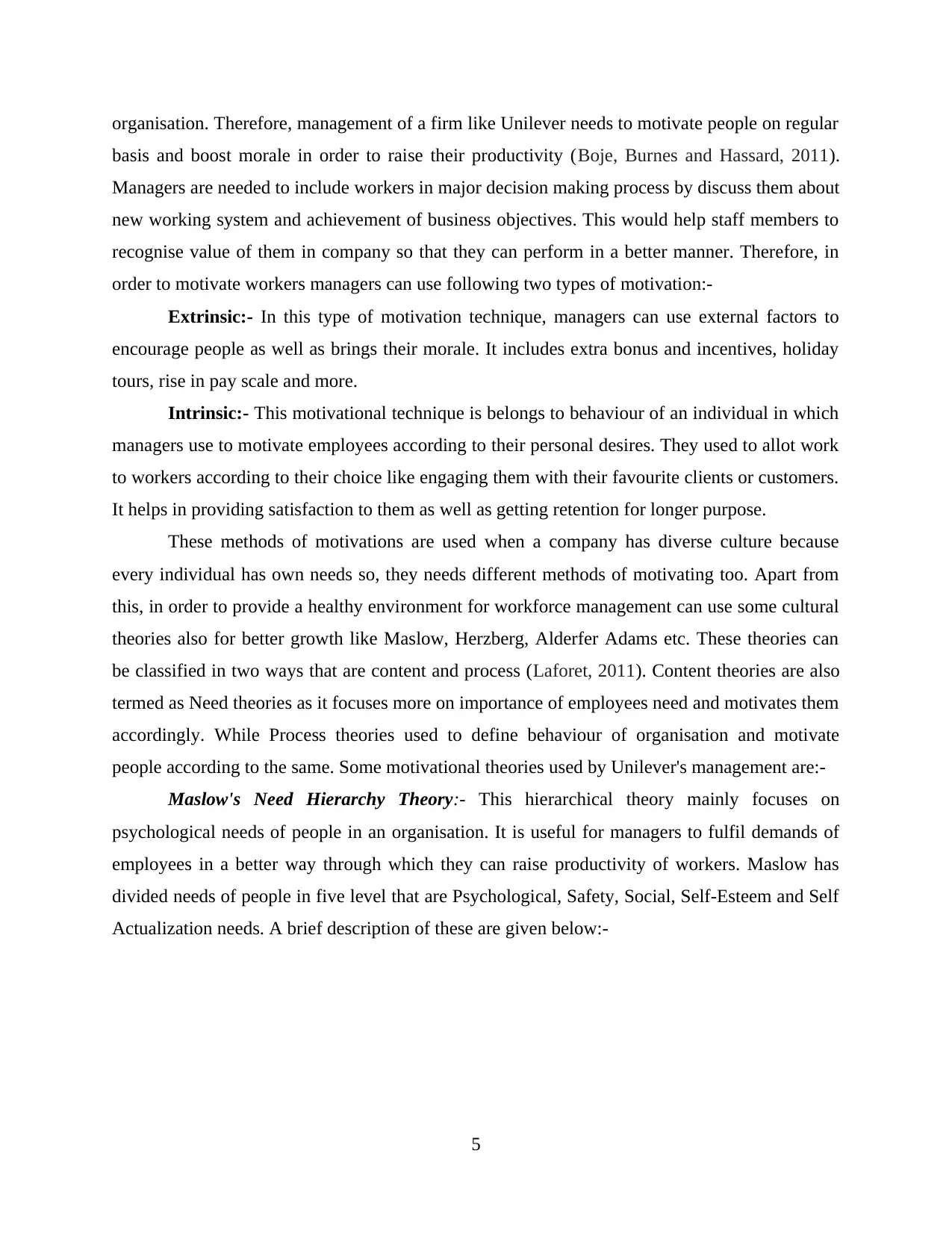
organisation. Therefore, management of a firm like Unilever needs to motivate people on regular
basis and boost morale in order to raise their productivity (Boje, Burnes and Hassard, 2011).
Managers are needed to include workers in major decision making process by discuss them about
new working system and achievement of business objectives. This would help staff members to
recognise value of them in company so that they can perform in a better manner. Therefore, in
order to motivate workers managers can use following two types of motivation:-
Extrinsic:- In this type of motivation technique, managers can use external factors to
encourage people as well as brings their morale. It includes extra bonus and incentives, holiday
tours, rise in pay scale and more.
Intrinsic:- This motivational technique is belongs to behaviour of an individual in which
managers use to motivate employees according to their personal desires. They used to allot work
to workers according to their choice like engaging them with their favourite clients or customers.
It helps in providing satisfaction to them as well as getting retention for longer purpose.
These methods of motivations are used when a company has diverse culture because
every individual has own needs so, they needs different methods of motivating too. Apart from
this, in order to provide a healthy environment for workforce management can use some cultural
theories also for better growth like Maslow, Herzberg, Alderfer Adams etc. These theories can
be classified in two ways that are content and process (Laforet, 2011). Content theories are also
termed as Need theories as it focuses more on importance of employees need and motivates them
accordingly. While Process theories used to define behaviour of organisation and motivate
people according to the same. Some motivational theories used by Unilever's management are:-
Maslow's Need Hierarchy Theory:- This hierarchical theory mainly focuses on
psychological needs of people in an organisation. It is useful for managers to fulfil demands of
employees in a better way through which they can raise productivity of workers. Maslow has
divided needs of people in five level that are Psychological, Safety, Social, Self-Esteem and Self
Actualization needs. A brief description of these are given below:-
5
basis and boost morale in order to raise their productivity (Boje, Burnes and Hassard, 2011).
Managers are needed to include workers in major decision making process by discuss them about
new working system and achievement of business objectives. This would help staff members to
recognise value of them in company so that they can perform in a better manner. Therefore, in
order to motivate workers managers can use following two types of motivation:-
Extrinsic:- In this type of motivation technique, managers can use external factors to
encourage people as well as brings their morale. It includes extra bonus and incentives, holiday
tours, rise in pay scale and more.
Intrinsic:- This motivational technique is belongs to behaviour of an individual in which
managers use to motivate employees according to their personal desires. They used to allot work
to workers according to their choice like engaging them with their favourite clients or customers.
It helps in providing satisfaction to them as well as getting retention for longer purpose.
These methods of motivations are used when a company has diverse culture because
every individual has own needs so, they needs different methods of motivating too. Apart from
this, in order to provide a healthy environment for workforce management can use some cultural
theories also for better growth like Maslow, Herzberg, Alderfer Adams etc. These theories can
be classified in two ways that are content and process (Laforet, 2011). Content theories are also
termed as Need theories as it focuses more on importance of employees need and motivates them
accordingly. While Process theories used to define behaviour of organisation and motivate
people according to the same. Some motivational theories used by Unilever's management are:-
Maslow's Need Hierarchy Theory:- This hierarchical theory mainly focuses on
psychological needs of people in an organisation. It is useful for managers to fulfil demands of
employees in a better way through which they can raise productivity of workers. Maslow has
divided needs of people in five level that are Psychological, Safety, Social, Self-Esteem and Self
Actualization needs. A brief description of these are given below:-
5
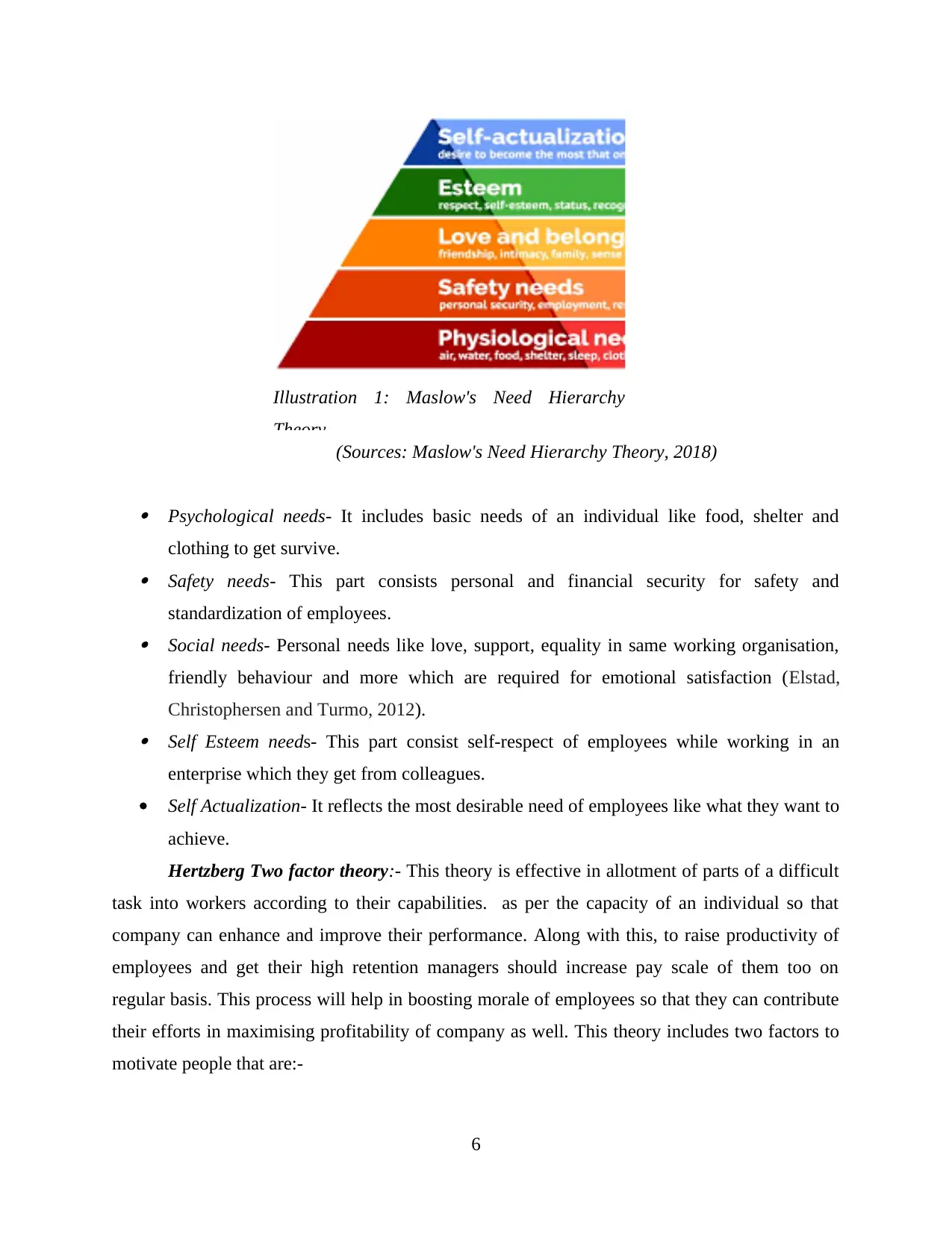
(Sources: Maslow's Need Hierarchy Theory, 2018)
Psychological needs- It includes basic needs of an individual like food, shelter and
clothing to get survive. Safety needs- This part consists personal and financial security for safety and
standardization of employees. Social needs- Personal needs like love, support, equality in same working organisation,
friendly behaviour and more which are required for emotional satisfaction (Elstad,
Christophersen and Turmo, 2012). Self Esteem needs- This part consist self-respect of employees while working in an
enterprise which they get from colleagues.
Self Actualization- It reflects the most desirable need of employees like what they want to
achieve.
Hertzberg Two factor theory:- This theory is effective in allotment of parts of a difficult
task into workers according to their capabilities. as per the capacity of an individual so that
company can enhance and improve their performance. Along with this, to raise productivity of
employees and get their high retention managers should increase pay scale of them too on
regular basis. This process will help in boosting morale of employees so that they can contribute
their efforts in maximising profitability of company as well. This theory includes two factors to
motivate people that are:-
6
Illustration 1: Maslow's Need Hierarchy
Theory
Psychological needs- It includes basic needs of an individual like food, shelter and
clothing to get survive. Safety needs- This part consists personal and financial security for safety and
standardization of employees. Social needs- Personal needs like love, support, equality in same working organisation,
friendly behaviour and more which are required for emotional satisfaction (Elstad,
Christophersen and Turmo, 2012). Self Esteem needs- This part consist self-respect of employees while working in an
enterprise which they get from colleagues.
Self Actualization- It reflects the most desirable need of employees like what they want to
achieve.
Hertzberg Two factor theory:- This theory is effective in allotment of parts of a difficult
task into workers according to their capabilities. as per the capacity of an individual so that
company can enhance and improve their performance. Along with this, to raise productivity of
employees and get their high retention managers should increase pay scale of them too on
regular basis. This process will help in boosting morale of employees so that they can contribute
their efforts in maximising profitability of company as well. This theory includes two factors to
motivate people that are:-
6
Illustration 1: Maslow's Need Hierarchy
Theory
⊘ This is a preview!⊘
Do you want full access?
Subscribe today to unlock all pages.

Trusted by 1+ million students worldwide
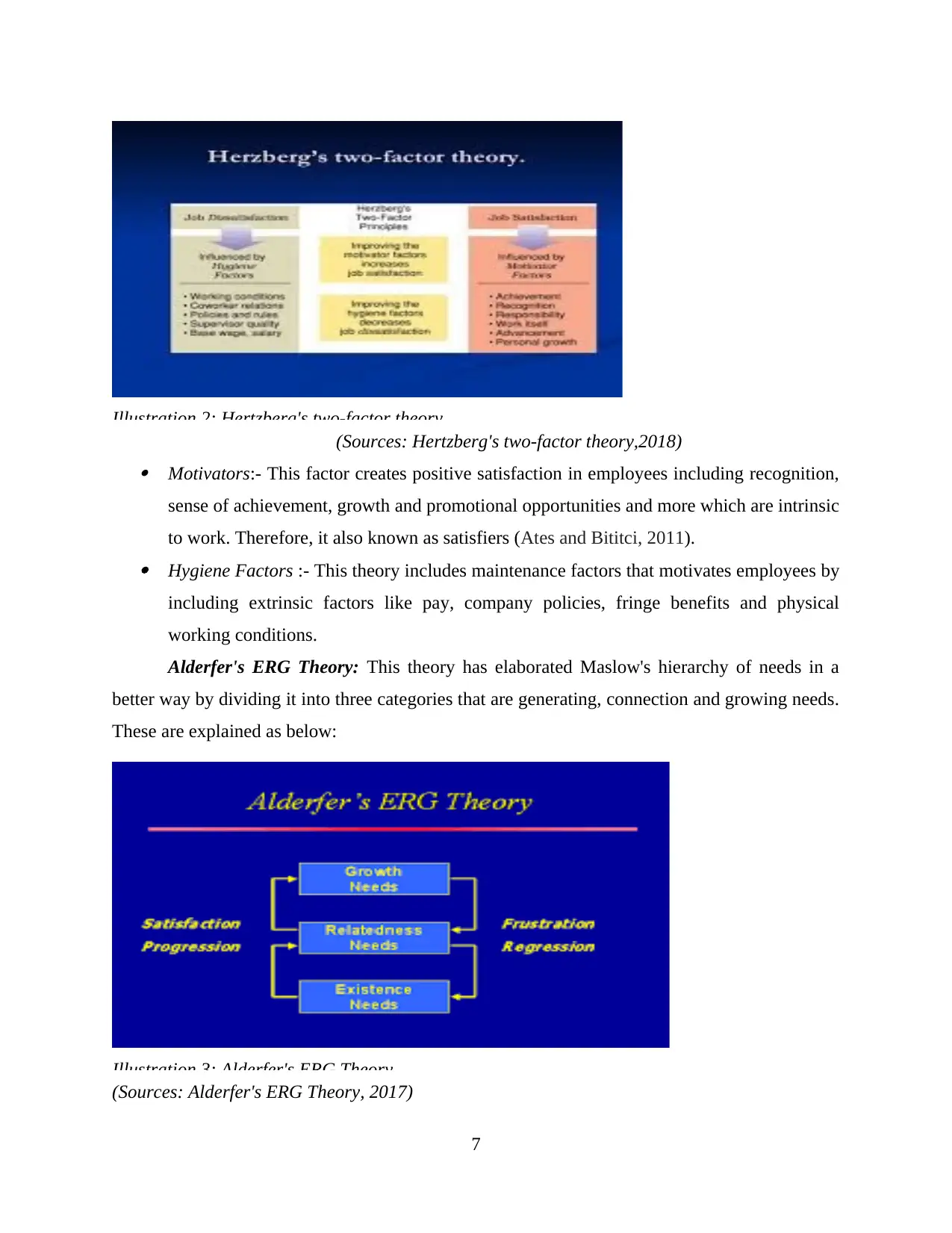
Illustration 2: Hertzberg's two-factor theory
(Sources: Hertzberg's two-factor theory,2018) Motivators:- This factor creates positive satisfaction in employees including recognition,
sense of achievement, growth and promotional opportunities and more which are intrinsic
to work. Therefore, it also known as satisfiers (Ates and Bititci, 2011). Hygiene Factors :- This theory includes maintenance factors that motivates employees by
including extrinsic factors like pay, company policies, fringe benefits and physical
working conditions.
Alderfer's ERG Theory: This theory has elaborated Maslow's hierarchy of needs in a
better way by dividing it into three categories that are generating, connection and growing needs.
These are explained as below:
Illustration 3: Alderfer's ERG Theory
(Sources: Alderfer's ERG Theory, 2017)
7
(Sources: Hertzberg's two-factor theory,2018) Motivators:- This factor creates positive satisfaction in employees including recognition,
sense of achievement, growth and promotional opportunities and more which are intrinsic
to work. Therefore, it also known as satisfiers (Ates and Bititci, 2011). Hygiene Factors :- This theory includes maintenance factors that motivates employees by
including extrinsic factors like pay, company policies, fringe benefits and physical
working conditions.
Alderfer's ERG Theory: This theory has elaborated Maslow's hierarchy of needs in a
better way by dividing it into three categories that are generating, connection and growing needs.
These are explained as below:
Illustration 3: Alderfer's ERG Theory
(Sources: Alderfer's ERG Theory, 2017)
7
Paraphrase This Document
Need a fresh take? Get an instant paraphrase of this document with our AI Paraphraser
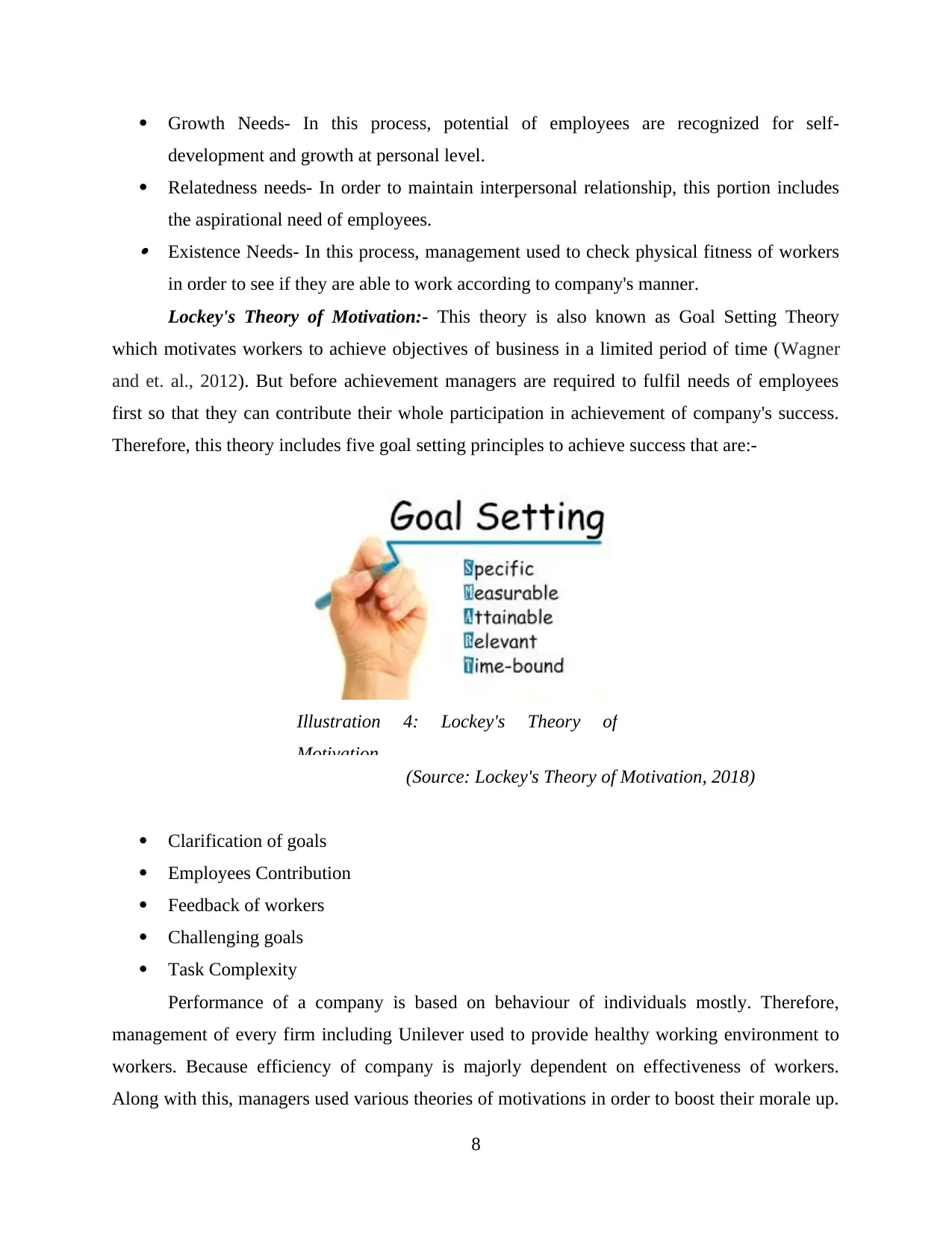
Growth Needs- In this process, potential of employees are recognized for self-
development and growth at personal level.
Relatedness needs- In order to maintain interpersonal relationship, this portion includes
the aspirational need of employees. Existence Needs- In this process, management used to check physical fitness of workers
in order to see if they are able to work according to company's manner.
Lockey's Theory of Motivation:- This theory is also known as Goal Setting Theory
which motivates workers to achieve objectives of business in a limited period of time (Wagner
and et. al., 2012). But before achievement managers are required to fulfil needs of employees
first so that they can contribute their whole participation in achievement of company's success.
Therefore, this theory includes five goal setting principles to achieve success that are:-
(Source: Lockey's Theory of Motivation, 2018)
Clarification of goals
Employees Contribution
Feedback of workers
Challenging goals
Task Complexity
Performance of a company is based on behaviour of individuals mostly. Therefore,
management of every firm including Unilever used to provide healthy working environment to
workers. Because efficiency of company is majorly dependent on effectiveness of workers.
Along with this, managers used various theories of motivations in order to boost their morale up.
8
Illustration 4: Lockey's Theory of
Motivation
development and growth at personal level.
Relatedness needs- In order to maintain interpersonal relationship, this portion includes
the aspirational need of employees. Existence Needs- In this process, management used to check physical fitness of workers
in order to see if they are able to work according to company's manner.
Lockey's Theory of Motivation:- This theory is also known as Goal Setting Theory
which motivates workers to achieve objectives of business in a limited period of time (Wagner
and et. al., 2012). But before achievement managers are required to fulfil needs of employees
first so that they can contribute their whole participation in achievement of company's success.
Therefore, this theory includes five goal setting principles to achieve success that are:-
(Source: Lockey's Theory of Motivation, 2018)
Clarification of goals
Employees Contribution
Feedback of workers
Challenging goals
Task Complexity
Performance of a company is based on behaviour of individuals mostly. Therefore,
management of every firm including Unilever used to provide healthy working environment to
workers. Because efficiency of company is majorly dependent on effectiveness of workers.
Along with this, managers used various theories of motivations in order to boost their morale up.
8
Illustration 4: Lockey's Theory of
Motivation
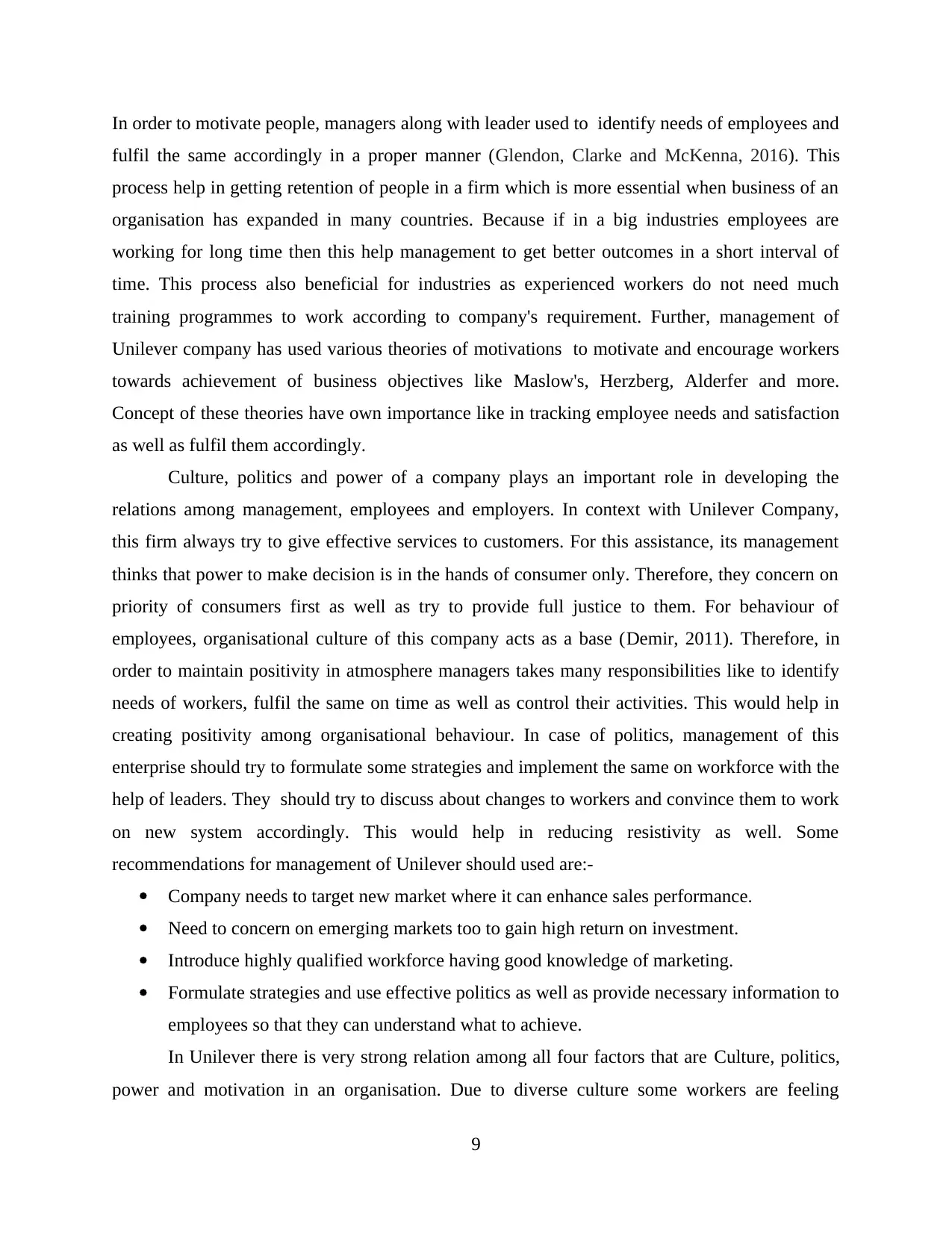
In order to motivate people, managers along with leader used to identify needs of employees and
fulfil the same accordingly in a proper manner (Glendon, Clarke and McKenna, 2016). This
process help in getting retention of people in a firm which is more essential when business of an
organisation has expanded in many countries. Because if in a big industries employees are
working for long time then this help management to get better outcomes in a short interval of
time. This process also beneficial for industries as experienced workers do not need much
training programmes to work according to company's requirement. Further, management of
Unilever company has used various theories of motivations to motivate and encourage workers
towards achievement of business objectives like Maslow's, Herzberg, Alderfer and more.
Concept of these theories have own importance like in tracking employee needs and satisfaction
as well as fulfil them accordingly.
Culture, politics and power of a company plays an important role in developing the
relations among management, employees and employers. In context with Unilever Company,
this firm always try to give effective services to customers. For this assistance, its management
thinks that power to make decision is in the hands of consumer only. Therefore, they concern on
priority of consumers first as well as try to provide full justice to them. For behaviour of
employees, organisational culture of this company acts as a base (Demir, 2011). Therefore, in
order to maintain positivity in atmosphere managers takes many responsibilities like to identify
needs of workers, fulfil the same on time as well as control their activities. This would help in
creating positivity among organisational behaviour. In case of politics, management of this
enterprise should try to formulate some strategies and implement the same on workforce with the
help of leaders. They should try to discuss about changes to workers and convince them to work
on new system accordingly. This would help in reducing resistivity as well. Some
recommendations for management of Unilever should used are:-
Company needs to target new market where it can enhance sales performance.
Need to concern on emerging markets too to gain high return on investment.
Introduce highly qualified workforce having good knowledge of marketing.
Formulate strategies and use effective politics as well as provide necessary information to
employees so that they can understand what to achieve.
In Unilever there is very strong relation among all four factors that are Culture, politics,
power and motivation in an organisation. Due to diverse culture some workers are feeling
9
fulfil the same accordingly in a proper manner (Glendon, Clarke and McKenna, 2016). This
process help in getting retention of people in a firm which is more essential when business of an
organisation has expanded in many countries. Because if in a big industries employees are
working for long time then this help management to get better outcomes in a short interval of
time. This process also beneficial for industries as experienced workers do not need much
training programmes to work according to company's requirement. Further, management of
Unilever company has used various theories of motivations to motivate and encourage workers
towards achievement of business objectives like Maslow's, Herzberg, Alderfer and more.
Concept of these theories have own importance like in tracking employee needs and satisfaction
as well as fulfil them accordingly.
Culture, politics and power of a company plays an important role in developing the
relations among management, employees and employers. In context with Unilever Company,
this firm always try to give effective services to customers. For this assistance, its management
thinks that power to make decision is in the hands of consumer only. Therefore, they concern on
priority of consumers first as well as try to provide full justice to them. For behaviour of
employees, organisational culture of this company acts as a base (Demir, 2011). Therefore, in
order to maintain positivity in atmosphere managers takes many responsibilities like to identify
needs of workers, fulfil the same on time as well as control their activities. This would help in
creating positivity among organisational behaviour. In case of politics, management of this
enterprise should try to formulate some strategies and implement the same on workforce with the
help of leaders. They should try to discuss about changes to workers and convince them to work
on new system accordingly. This would help in reducing resistivity as well. Some
recommendations for management of Unilever should used are:-
Company needs to target new market where it can enhance sales performance.
Need to concern on emerging markets too to gain high return on investment.
Introduce highly qualified workforce having good knowledge of marketing.
Formulate strategies and use effective politics as well as provide necessary information to
employees so that they can understand what to achieve.
In Unilever there is very strong relation among all four factors that are Culture, politics,
power and motivation in an organisation. Due to diverse culture some workers are feeling
9
⊘ This is a preview!⊘
Do you want full access?
Subscribe today to unlock all pages.

Trusted by 1+ million students worldwide
1 out of 17
Related Documents
Your All-in-One AI-Powered Toolkit for Academic Success.
+13062052269
info@desklib.com
Available 24*7 on WhatsApp / Email
![[object Object]](/_next/static/media/star-bottom.7253800d.svg)
Unlock your academic potential
Copyright © 2020–2025 A2Z Services. All Rights Reserved. Developed and managed by ZUCOL.





